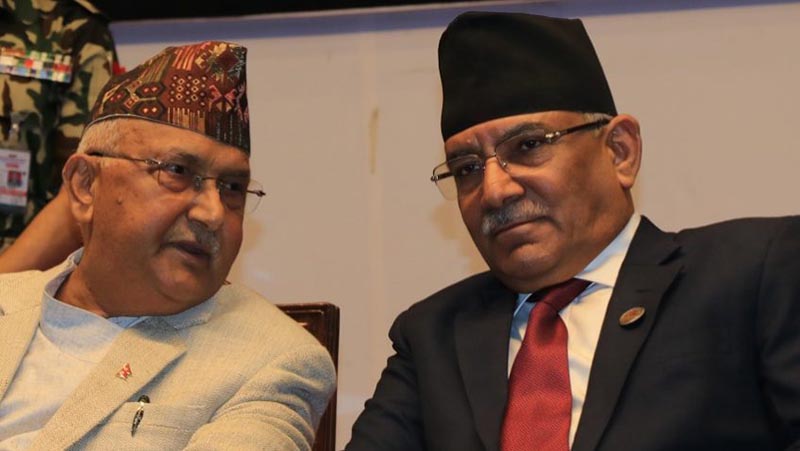Stalemate in ruling party on speaker nomination continues
Kathmandu, January 14
Somewhat subdued after Nepal Communist Party (NCP) Co-chair Pushpa Kamal Dahal was given executive powers, factional feud in the ruling party is peaking once again, with the party’s candidate for the speaker’s post being the major bone of contention.
This time, according to party insiders, stakes are even higher as the issue has now become a matter of prestige for the two major factions in the party — those representing former CPN-UML and those coming from former CPN-MC.
So much so that leaders are not even shying away from predicting a turmoil in the NCP should the two co-chairs — Dahal and Prime Minister KP Sharma Oli — fail to amicably sort out the present stalemate at the earliest. Dahal today publicly said in Chitwan that politics had got complicated at the centre and would take some time to resolve.
The impasse ensued after the arrest of former speaker of the House of Representatives Krishna Bahadur Mahara in October, rendering the constitutional post vacant. Worsening the deadlock, Oli and Dahal have firmly stuck to their guns. While former speaker Subas Chandra Nembang has been PM Oli’s favourite from the beginning, Dahal is rooting for either Agni Sapkota or Pampha Bhusal.
Adding to the crisis, Deputy Speaker Shiva Maya Tumbahangphe has also staked claim to the speaker’s post and she reportedly has President Bidhya Devi Bhandari’s backing. Even as the NCP secretariat decided on Saturday that Tumbahangphe must resign to pave the way for the beginning of the process of electing the speaker, she has refused to put in her papers. Her standard response has been: “I’ll resign only after the party finalises speaker candidate.”
This is where the former CPN-MC camp smells a rat. An NCP standing committee member representing the former CPN-MC said the statement of Tumbahangphe (from former UML) meant she would resign only if a candidate from former UML was nominated.
He said Dahal had settled for ‘the so-called executive chairperson’ even as he and Oli had agreed to take turns to become prime minister, but his camp would not forfeit the remaining top post allocated to the erstwhile CPN-MC before the merger.
“The PM, deputy prime minister, national assembly chairman, party chief and most of the ministers are from former UML,” said the leader. “We also need to take care of our workers’ sentiments. We just do not want to get banished by forgoing the remaining top post of speaker.” The standing committee leader said the stalemate, if prolonged, would not only affect the party but also the government. Because of the NCP’s indecision on nominating a candidate for the HoR speaker, the HoR has not been able to convene though the Bill Session kicked off almost a month ago.
“If the stalemate prolongs, the government, and ultimately, the prime minister will land in trouble,” the leader said. “You can only push someone to some extent, after that you have to retreat.”
On the other hand, former UML leaders say the pre-poll agreement had already been honoured, and that it did not mean that one agreement should be applicable always. They are also of the view that since the two parties have now merged, it does not matter who came from which group.
“You take decisions on the basis of the need of the hour,” a standing committee member from former UML said. “Nonetheless, this polarisation will take the party nowhere. So we hope the two co-chairs will decide amicably.”






